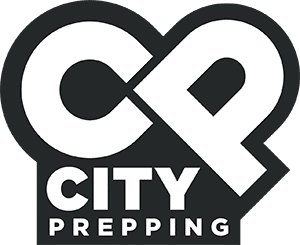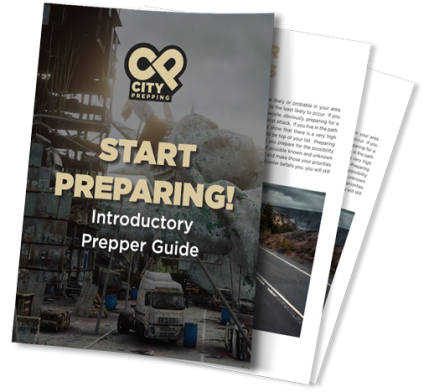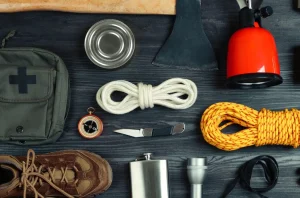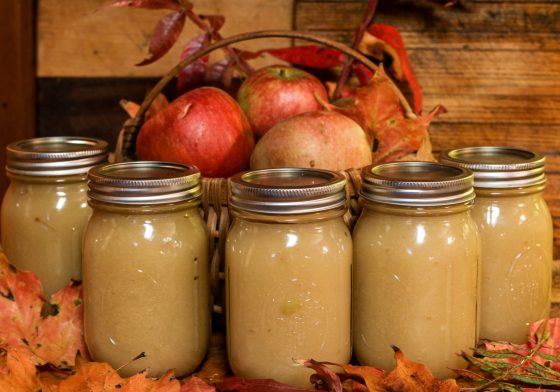Hunting & Fishing
 Perhaps one of the oldest skills, hunting and fishing puts meat on the table. Most people today are heavily reliant upon the meat and fishing industries to put protein on their plates. Industrial meat and fishing production have introduced a wide range of toxins to our tables as well. From Escherichia coli, commonly known as E. coli, to high levels of Mercury in our seafood, our over-dependence on industrial sources of meat is a fragile source when health is also at stake. Also, the types of meats we put on our plate lacks variation. There are hundreds of chicken breeds in existence, for instance, yet industrial farming only produces a few. According to FishBase, a global species database, there are over 33,000 different types of fish, yet the average American could probably list the types of fish they have eaten on one hand- two hands at the most.
It’s great to have an emergency fishing line and hook in your tackle, but will you know how to use it when the time comes? Have you ever processed meat for your own table? Hunting and fishing are skills you need to know, not only so you can secure food for your table, but so you can trade food for other things you may need. If money becomes relatively worthless because of an economic collapse and hyperinflation, venison steaks, frog legs or a 20lb Catfish hold tremendous value.
Perhaps one of the oldest skills, hunting and fishing puts meat on the table. Most people today are heavily reliant upon the meat and fishing industries to put protein on their plates. Industrial meat and fishing production have introduced a wide range of toxins to our tables as well. From Escherichia coli, commonly known as E. coli, to high levels of Mercury in our seafood, our over-dependence on industrial sources of meat is a fragile source when health is also at stake. Also, the types of meats we put on our plate lacks variation. There are hundreds of chicken breeds in existence, for instance, yet industrial farming only produces a few. According to FishBase, a global species database, there are over 33,000 different types of fish, yet the average American could probably list the types of fish they have eaten on one hand- two hands at the most.
It’s great to have an emergency fishing line and hook in your tackle, but will you know how to use it when the time comes? Have you ever processed meat for your own table? Hunting and fishing are skills you need to know, not only so you can secure food for your table, but so you can trade food for other things you may need. If money becomes relatively worthless because of an economic collapse and hyperinflation, venison steaks, frog legs or a 20lb Catfish hold tremendous value.
Foraging
 The second skill to get you by is foraging. Just as our tables lack diversity when it comes to meats, they also lack diversity when it comes to the edible plants we consume. Foraging for food is an essential skill to cultivate now– that pun is intended. Did you know you can eat the entire sunflower plant, not just the seed? Did you know you can eat daisies and many other flowers? Do you know what mushrooms, berries, and nuts you can eat? If you grew up in the Midwest or South, maybe you harvested gooseberries for grandma’s gooseberry pie. Knowing what parts of what plants are edible and in your area is critical to having food on your table when the normal supply chains we are overly-dependent upon disappear and our own stores of food dwindle low.
The second skill to get you by is foraging. Just as our tables lack diversity when it comes to meats, they also lack diversity when it comes to the edible plants we consume. Foraging for food is an essential skill to cultivate now– that pun is intended. Did you know you can eat the entire sunflower plant, not just the seed? Did you know you can eat daisies and many other flowers? Do you know what mushrooms, berries, and nuts you can eat? If you grew up in the Midwest or South, maybe you harvested gooseberries for grandma’s gooseberry pie. Knowing what parts of what plants are edible and in your area is critical to having food on your table when the normal supply chains we are overly-dependent upon disappear and our own stores of food dwindle low.
Gardening & Farming (plants & animals)
 Gardening and farming are the third skill types that will help you to survive through an extended depression. Remember, the Great Depression began in 1929 and lasted nearly a decade. Another depression may last just as long or longer. In another blog, we will be discussing apartment gardening, but if you are fortunate enough to have an area to garden, farm, or even raise chickens, goats or some other animal that produces food beyond their own meat, knowing these skills will allow you to thrive amidst the suffering. These skills put food directly on your table and, when done right, provide you with saleable or exchangeable products to carry your family through an extended economic downturn.
Gardening and farming are the third skill types that will help you to survive through an extended depression. Remember, the Great Depression began in 1929 and lasted nearly a decade. Another depression may last just as long or longer. In another blog, we will be discussing apartment gardening, but if you are fortunate enough to have an area to garden, farm, or even raise chickens, goats or some other animal that produces food beyond their own meat, knowing these skills will allow you to thrive amidst the suffering. These skills put food directly on your table and, when done right, provide you with saleable or exchangeable products to carry your family through an extended economic downturn.
Cooking & Canning
 Surviving a depression relies heavily upon your ability to not waste anything. Most of the meats used in modern barbecue were deemed inedible and given to poor folks or slaves. The long slow cooking and spicing of the tough meats created something delicious. Barbecue and smoking was used to preserve meat. After all, it would be difficult and foolish to attempt to eat a whole cow or pig in one sitting. So, cooking and not wasting foods are a critical part of surviving. During the Dust Bowl, where drought, rabbits, or grasshoppers wiped out almost all the vegetation, brined tumbleweed became food for consumption. Russian thistle, or tumbleweed, grew rampantly during this period—one of the few plants that could survive the harsh conditions. People became so desperate that they started to brine the tumbleweed, rendering it edible.
Our over-dependence on the pre-processed, pre-cooked food supply sources will make it very hard for many in a post-collapse environment. Knowing how to cook, can, and preserve your food are critical skills to keep you and your family fed through an economic depression. Once your family’s essential food needs are met, your surplus can be sold, bartered, or traded for other things you need. Four cups of dried beans that have been cooked can feed many, many hungry mouths.
Surviving a depression relies heavily upon your ability to not waste anything. Most of the meats used in modern barbecue were deemed inedible and given to poor folks or slaves. The long slow cooking and spicing of the tough meats created something delicious. Barbecue and smoking was used to preserve meat. After all, it would be difficult and foolish to attempt to eat a whole cow or pig in one sitting. So, cooking and not wasting foods are a critical part of surviving. During the Dust Bowl, where drought, rabbits, or grasshoppers wiped out almost all the vegetation, brined tumbleweed became food for consumption. Russian thistle, or tumbleweed, grew rampantly during this period—one of the few plants that could survive the harsh conditions. People became so desperate that they started to brine the tumbleweed, rendering it edible.
Our over-dependence on the pre-processed, pre-cooked food supply sources will make it very hard for many in a post-collapse environment. Knowing how to cook, can, and preserve your food are critical skills to keep you and your family fed through an economic depression. Once your family’s essential food needs are met, your surplus can be sold, bartered, or traded for other things you need. Four cups of dried beans that have been cooked can feed many, many hungry mouths.
Baking
 Ask a cook if he bakes or a baker if she cooks. The fact is that baking is a skill all in itself that can’t just be lumped in with cooking. Baking is a science that requires some exact measurements and precise temperatures and time. It’s not a skill you can just instantly pick-up, which is why you need to practice it before you really need to. Having just one bread loaf recipe or one cookie recipe won’t be enough to get you through a significant economic downturn. What will you do when flour isn’t available? Or butter? Or milk? You should know how to make flour from other sources, like acorns, chickpeas, or rice. Explore old recipes. Know how to make hardtack and not just a loaf of white bread. Try out other recipes now, before you absolutely need to.
Ask a cook if he bakes or a baker if she cooks. The fact is that baking is a skill all in itself that can’t just be lumped in with cooking. Baking is a science that requires some exact measurements and precise temperatures and time. It’s not a skill you can just instantly pick-up, which is why you need to practice it before you really need to. Having just one bread loaf recipe or one cookie recipe won’t be enough to get you through a significant economic downturn. What will you do when flour isn’t available? Or butter? Or milk? You should know how to make flour from other sources, like acorns, chickpeas, or rice. Explore old recipes. Know how to make hardtack and not just a loaf of white bread. Try out other recipes now, before you absolutely need to.
Sewing, Knitting, Crocheting, Brading, Knot tying
 Sewing, knitting, crocheting, braiding, knot tying, and any manipulation of textiles or threads and ropes are valuable skills to know in a prolonged economic depression. Whether you are knitting a blanket or hats to keep your children warm, repairing a last pair of jeans to last another year, or harvesting an old sweater to make threads for a fishing net, the manipulation of fabrics and threads are a skill you can’t live without. Most people only know how to tie a square knot, but that won’t hold a heavy load or secure a fishing hook. Just as a single strand of rope isn’t as strong as multiple strands wound together, the more you know of these sciences the more likely you are to be able to produce what you need to survive and to have a skill in high demand in a post-collapse society.
Sewing, knitting, crocheting, braiding, knot tying, and any manipulation of textiles or threads and ropes are valuable skills to know in a prolonged economic depression. Whether you are knitting a blanket or hats to keep your children warm, repairing a last pair of jeans to last another year, or harvesting an old sweater to make threads for a fishing net, the manipulation of fabrics and threads are a skill you can’t live without. Most people only know how to tie a square knot, but that won’t hold a heavy load or secure a fishing hook. Just as a single strand of rope isn’t as strong as multiple strands wound together, the more you know of these sciences the more likely you are to be able to produce what you need to survive and to have a skill in high demand in a post-collapse society.
Homebrewing & Fermentation
 We put home brewing and fermentation together because the science of how they work is similar. Technically, we could have put it along with baking, since bread-making often involves yeast consuming sugars. That’s really all there is to fermentation and homebrewing, either yeast or bacteria consume available sugars and produces either alcohol or lactic acid. Both of those by-products are useful in their own ways. That, obviously, oversimplifies the process. There’s much to learn with these skills, and whether you’re making beer, mead, Dandelion wine, or pickled tumbleweed, they are skills you need to learn now. Making an error in the processes can create more waste than usable products. The fact of it all is that people will always want alcohol to consume, so having the skill of homebrewing provides you with a basic skill you can barter, sell, or exchange within a prolonged economic downturn. It’s important to point out here that learning to can foods also exposes you to the skill of fermentation. Many of these skills overlap with each other. If you harvest cucumbers from your garden, you can extend their usage by knowing how to ferment them into pickles.
We put home brewing and fermentation together because the science of how they work is similar. Technically, we could have put it along with baking, since bread-making often involves yeast consuming sugars. That’s really all there is to fermentation and homebrewing, either yeast or bacteria consume available sugars and produces either alcohol or lactic acid. Both of those by-products are useful in their own ways. That, obviously, oversimplifies the process. There’s much to learn with these skills, and whether you’re making beer, mead, Dandelion wine, or pickled tumbleweed, they are skills you need to learn now. Making an error in the processes can create more waste than usable products. The fact of it all is that people will always want alcohol to consume, so having the skill of homebrewing provides you with a basic skill you can barter, sell, or exchange within a prolonged economic downturn. It’s important to point out here that learning to can foods also exposes you to the skill of fermentation. Many of these skills overlap with each other. If you harvest cucumbers from your garden, you can extend their usage by knowing how to ferment them into pickles.
Mechanics & Engineering
 If it ain’t broke, don’t fix it, the old adage says, but what do you do when the one machine you rely upon the most breaks and you have nothing to replace it? What do you do when you suddenly need something manufactured but don’t know how to? Mechanical and engineering skills are critical. Many of us may remember the amazing ingenuity exhibited by our grandfathers to fix, repair, or innovate a brand new item to fulfill a need or make life easier. Our industrious ancestors used a single steam or diesel engine to do everything from washing clothes to pumping water to threshing crops.
Tools are useless unless you know how to use them, and using them well can provide you with a skill in high demand in a prolonged economic depression. Whether you are making what you need, repairing something for someone else, or repurposing what someone else thinks is useless garbage, understanding mechanics and engineering is a life skill that can get you through the toughest of times. Start now to understand this useful skill. Don’t throw out that broken computer or fan. Take it apart and harvest the RAM chips and Solid State Drive or the copper wire. Understand how it works and if it can be fixed.
If it ain’t broke, don’t fix it, the old adage says, but what do you do when the one machine you rely upon the most breaks and you have nothing to replace it? What do you do when you suddenly need something manufactured but don’t know how to? Mechanical and engineering skills are critical. Many of us may remember the amazing ingenuity exhibited by our grandfathers to fix, repair, or innovate a brand new item to fulfill a need or make life easier. Our industrious ancestors used a single steam or diesel engine to do everything from washing clothes to pumping water to threshing crops.
Tools are useless unless you know how to use them, and using them well can provide you with a skill in high demand in a prolonged economic depression. Whether you are making what you need, repairing something for someone else, or repurposing what someone else thinks is useless garbage, understanding mechanics and engineering is a life skill that can get you through the toughest of times. Start now to understand this useful skill. Don’t throw out that broken computer or fan. Take it apart and harvest the RAM chips and Solid State Drive or the copper wire. Understand how it works and if it can be fixed.
Medical Sciences
 The medical sciences are another skill that can get you through another great depression. You don’t have to be a doctor, but you can easily become a certified EMT or certified in CPR. Every skill you learn in the medical sciences will not only increase your chances of survival in a variety of situations, but they will allow you to care for others. We have all seen the movies where the prisoner becomes the only person that can provide the right medical attention to save the captor chief’s children or spouse. The reason we have all seen that plot is because medicine is nearly archetypal. Caring for others and rescuing people from certain death is in our DNA.
Whether you study herbal medicines or how to stop bleeding and prevent infection, every skill you learn in the medical sciences can pay the greatest dividend of all– life. You may never need to use skills to stop someone from choking or to revive them when they stop breathing, but knowing those skills will assuredly not be a waste. Learn how to suture, set a broken bone, clean and dress a wound, and so on. Preparing for the worst now can mean surviving when the worst comes.
The medical sciences are another skill that can get you through another great depression. You don’t have to be a doctor, but you can easily become a certified EMT or certified in CPR. Every skill you learn in the medical sciences will not only increase your chances of survival in a variety of situations, but they will allow you to care for others. We have all seen the movies where the prisoner becomes the only person that can provide the right medical attention to save the captor chief’s children or spouse. The reason we have all seen that plot is because medicine is nearly archetypal. Caring for others and rescuing people from certain death is in our DNA.
Whether you study herbal medicines or how to stop bleeding and prevent infection, every skill you learn in the medical sciences can pay the greatest dividend of all– life. You may never need to use skills to stop someone from choking or to revive them when they stop breathing, but knowing those skills will assuredly not be a waste. Learn how to suture, set a broken bone, clean and dress a wound, and so on. Preparing for the worst now can mean surviving when the worst comes.
Teaching, Childcare, Natal & Postnatal Care
 The final skill we chose to cover is about kinder care: teaching, childcare, natal and postnatal care. Children aren’t born with user manuals. Ask any parent what they had to learn at the moment when raising their child. Knowing how to give birth to a child, becoming a lactation expert, caring for small infants and children, even teaching, require very specific skills. Fortunately, if you’ve ever had a child, you already know some of the skills.
When the schools closed in 2020, many people began homeschooling or formed small community groups to share and exchange information. When both parents have to work to make ends meet, someone has to look after the children. Someone has to teach the children and productively engage their time. People aren’t going to want to leave their children with someone they don’t perceive to have these skills, but they’re not skills you can suddenly just declare that you have.
Conclusion
That’s a quick overview of the 10 skills that will be in the highest demand during an economic depression. Beyond that, they are the skills you will most need during any economic crisis that lasts months, years, or even a decade. The nice thing about skills is that once you develop them, you can rapidly deploy them when the situation arises where you most need to. Whether hunting and fishing, foraging, cooking and canning, baking, sewing and knitting, homebrewing and fermentation, mechanics and engineering, or the care and education of children is your thing, you need to cultivate as many skills as you can now. It’s the most essential part of prepping, though it often gets overlooked as people prepare for food, water, and shelter security. But while those 3 basics of survival can be taken away from you or may run in short supply from time-to-time, skills can leverage your survival chances through an extended crisis. Skills not only increase your ability to survive through a disaster, but they also become a commodity to help you get what you need to continue to survive.
It is hard to limit all the great skills out there to a list of the ones you think are the top 10, so we would love to hear what you think might be a useful skill during a prolonged economic depression. If you found this article informative and helpful, please feel free to like and share it with your friends, family, and community. If you have any comments or anything you would like to share, please feel free to leave a comment in the section below.
The final skill we chose to cover is about kinder care: teaching, childcare, natal and postnatal care. Children aren’t born with user manuals. Ask any parent what they had to learn at the moment when raising their child. Knowing how to give birth to a child, becoming a lactation expert, caring for small infants and children, even teaching, require very specific skills. Fortunately, if you’ve ever had a child, you already know some of the skills.
When the schools closed in 2020, many people began homeschooling or formed small community groups to share and exchange information. When both parents have to work to make ends meet, someone has to look after the children. Someone has to teach the children and productively engage their time. People aren’t going to want to leave their children with someone they don’t perceive to have these skills, but they’re not skills you can suddenly just declare that you have.
Conclusion
That’s a quick overview of the 10 skills that will be in the highest demand during an economic depression. Beyond that, they are the skills you will most need during any economic crisis that lasts months, years, or even a decade. The nice thing about skills is that once you develop them, you can rapidly deploy them when the situation arises where you most need to. Whether hunting and fishing, foraging, cooking and canning, baking, sewing and knitting, homebrewing and fermentation, mechanics and engineering, or the care and education of children is your thing, you need to cultivate as many skills as you can now. It’s the most essential part of prepping, though it often gets overlooked as people prepare for food, water, and shelter security. But while those 3 basics of survival can be taken away from you or may run in short supply from time-to-time, skills can leverage your survival chances through an extended crisis. Skills not only increase your ability to survive through a disaster, but they also become a commodity to help you get what you need to continue to survive.
It is hard to limit all the great skills out there to a list of the ones you think are the top 10, so we would love to hear what you think might be a useful skill during a prolonged economic depression. If you found this article informative and helpful, please feel free to like and share it with your friends, family, and community. If you have any comments or anything you would like to share, please feel free to leave a comment in the section below. 






2 Responses
I agree your skill list is good. One can find many “normal” people in “normal” times that have some of these skills. What will be hard to find in abnormal times are persons who have security skills. Others will want to take — need to take — what you have in order for them to survive. Security skills involve more than just being able to run and gun with a black rifle. Good security skills require specific training and experiences that do not come about in normal day-to-day living. “I will share what I have with you if you can prevent others from taking all that I have”.
Please share